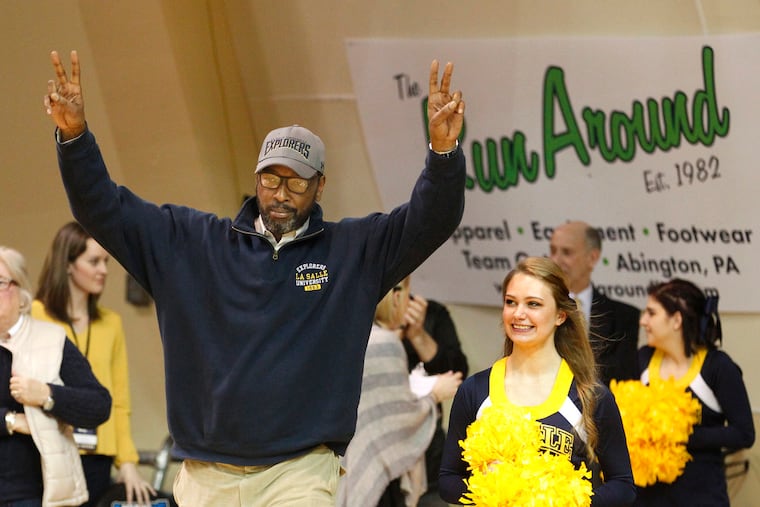City Six Rewind: Looking back at Lionel ‘L-Train’ Simmons’ career at La Salle
Simmons is Philly through and through. He attended South Philadelphia High School and won a Public League Championship in 1986.

Lionel “L-Train” Simmons tries to keep a lower profile these days.
He’s still in Philadelphia, helping out by giving out school supplies and turkeys, and he doesn’t want to be praised for it. He doesn’t get bothered much about his basketball days. The most he talks about it is when he gets together with former teammates a few times a year.
But the noise L-Train made in the late 1980s stills rings loud. He’s the Big Five’s all-time leading scorer and fourth in NCAA history with 3,217 career points. Simmons was the Associated Press Player of the Year in 1989-90, a two-time consensus All-American, and a winner of the Wooden and Naismith Awards.
“I’m the luckiest person in the world, because I played against so many people that could run, jump, shoot better and do all these things better than me, but for some reason, I was able to be successful,” Simmons said. “I sit here today, and I’m still amazed at how I did it.”
Simmons is Philly through and through. He attended South Philadelphia High School and won a Public League Championship in 1986.
When it came down to college, the Train was never leaving. His first choice was Villanova, but the Wildcats weren’t recruiting him. La Salle and Temple were the final options, and Simmons chose La Salle because of the chance to play his natural forward position and to play immediately.
La Salle coach Speedy Morris didn’t promise Simmons anything. He was going to need to earn a starting spot. The roster featured Tim Legler and Larry Koretz.
Freshmen were making impacts at La Salle before the 6-foot-7 forward arrived, but Morris had no idea what L-Train had in store.
“I knew he was going to be good, but I didn’t think he was going to be that good,” Morris said. “I don’t think anyone did.”
Simmons averaged 20.3 points and 9.8 rebounds as a freshman, and the show was just getting started. His sophomore year, he put up 23.3 points and 11.4 rebounds.
Each season, he added something new.
His junior year, he started to showcase a three-pointer. He made 21-of-56 threes and put up 28.4 points and 11.4 rebounds.
L-Train was the big man on campus at this point, as his former teammates put it. Yet, he wasn’t overly confident, loud, or vocal.
“He was a superstar, and you never knew it,” former teammate Keith Morris said. “He’s as humble a guy today as he was back then. He’ still that guy that does so much for so many, quietly."
Simmons’ success catapulted the Explorers into the national eye. La Salle was 24-10 his sophomore season and 26-6 his junior year. Both seasons ended with first-round NCAA Tournament losses.
So, NBA teams came calling, and Simmons had a decision to make. The Miami Heat wanted to draft him in the first round. It was about a $2 million opportunity, but Simmons turned it down.
“He was confident he could do better,” Morris said. “He enjoyed La Salle, he loved his teammates, and he wanted his degree. A lot of guys probably would’ve left, but he liked school.”
L-Train’s return meant La Salle had its most-talented roster yet. Future NBA guards Doug Overton and Randy Woods made a dynamic backcourt, and Bobby Johnson was right there to fill in as needed.
The Explorers went 30-2 in the 1989-90 season. The 30 wins is a program record.
“We did a lot of winning, and we had a lot of fun,” Simmons said. “I think all the guys that played on that team have memories that will carry us throughout our lifetime.”
La Salle lost in the second round of the NCAA Tournament to Clemson, 79-75. The Explorers’ lack of size came back to bite them, and they were out-rebounded 50-30. It’s one of the few vivid memories that has stuck with Simmons from that season.
“Being up 17 points at half and losing to Clemson in the tournament, I remember leaving the court in a blur like, did we just lose?” Simmons said.
Simmons became the seventh pick in the NBA Draft by the Sacramento Kings. He averaged 12.8 points and 6.2 rebounds in seven seasons.
In hindsight, his decision to stay in college led to a degree, a program record in wins, and an additional $5 million in his five-year, $7 million dollar rookie contract. It also helped him solidify his spot as one of the Big 5′s best players.
“He’s gotta be top five without a doubt, maybe even top three,” Morris said. “He certainly ranks way up there.”